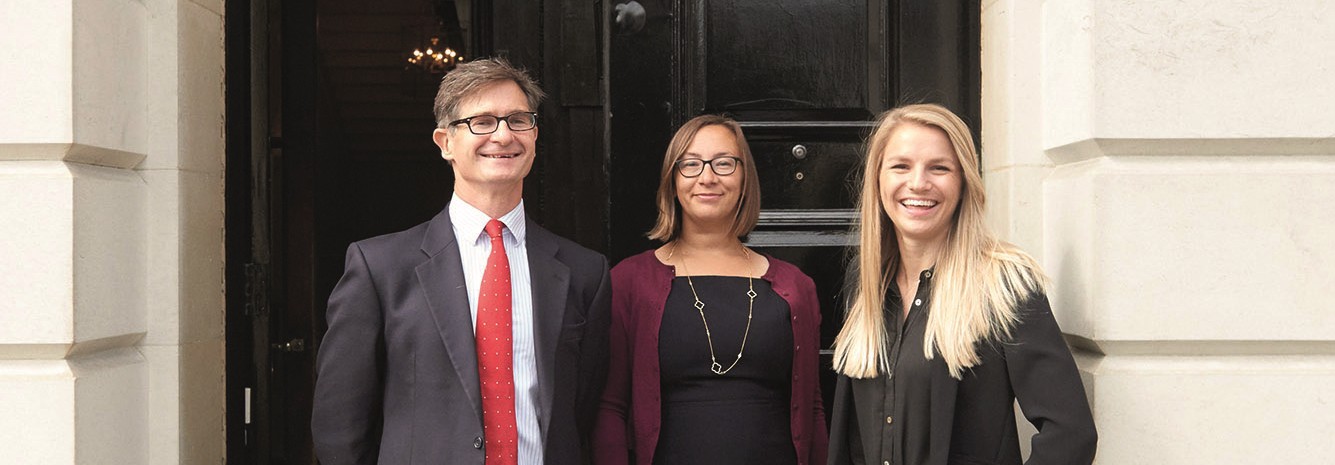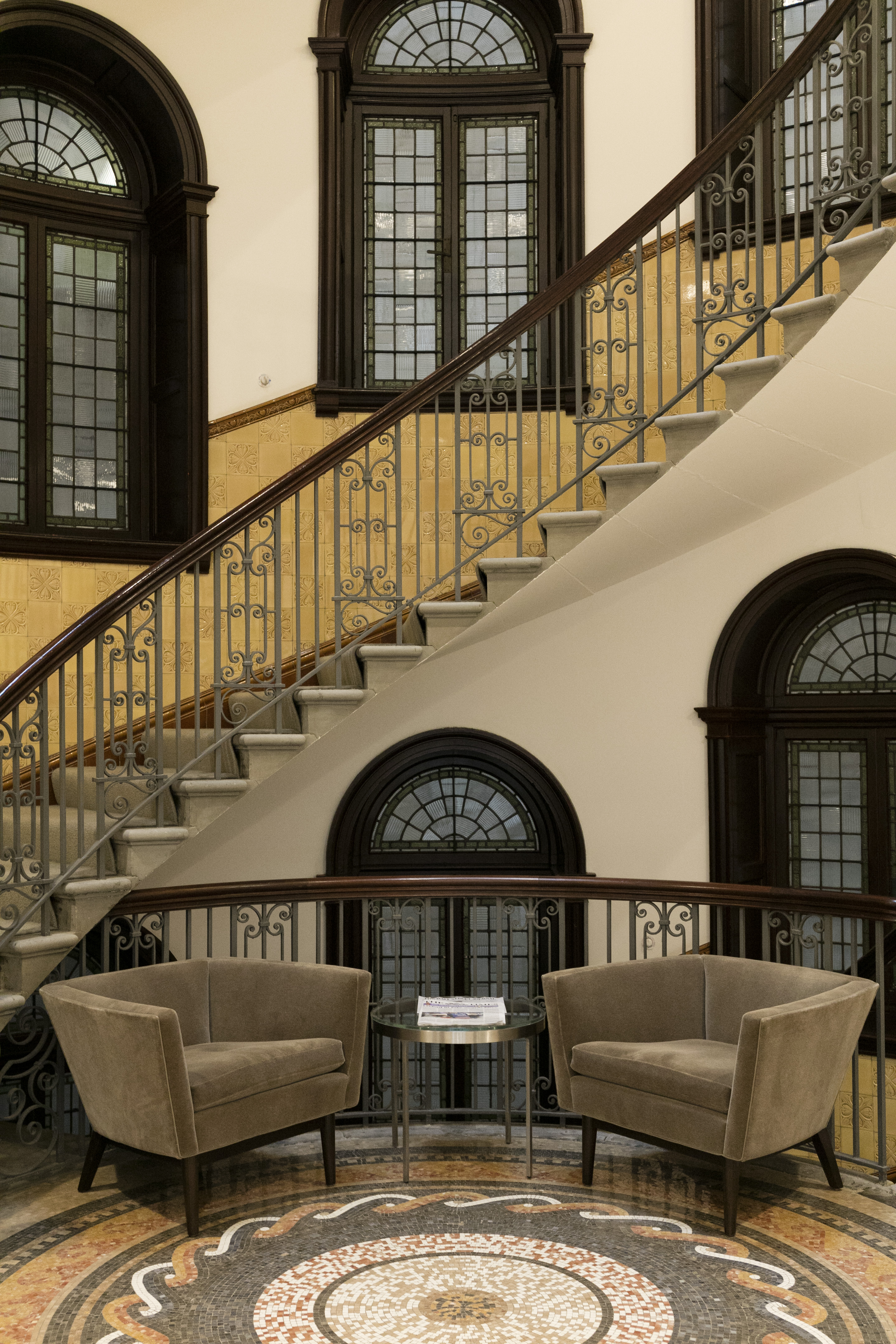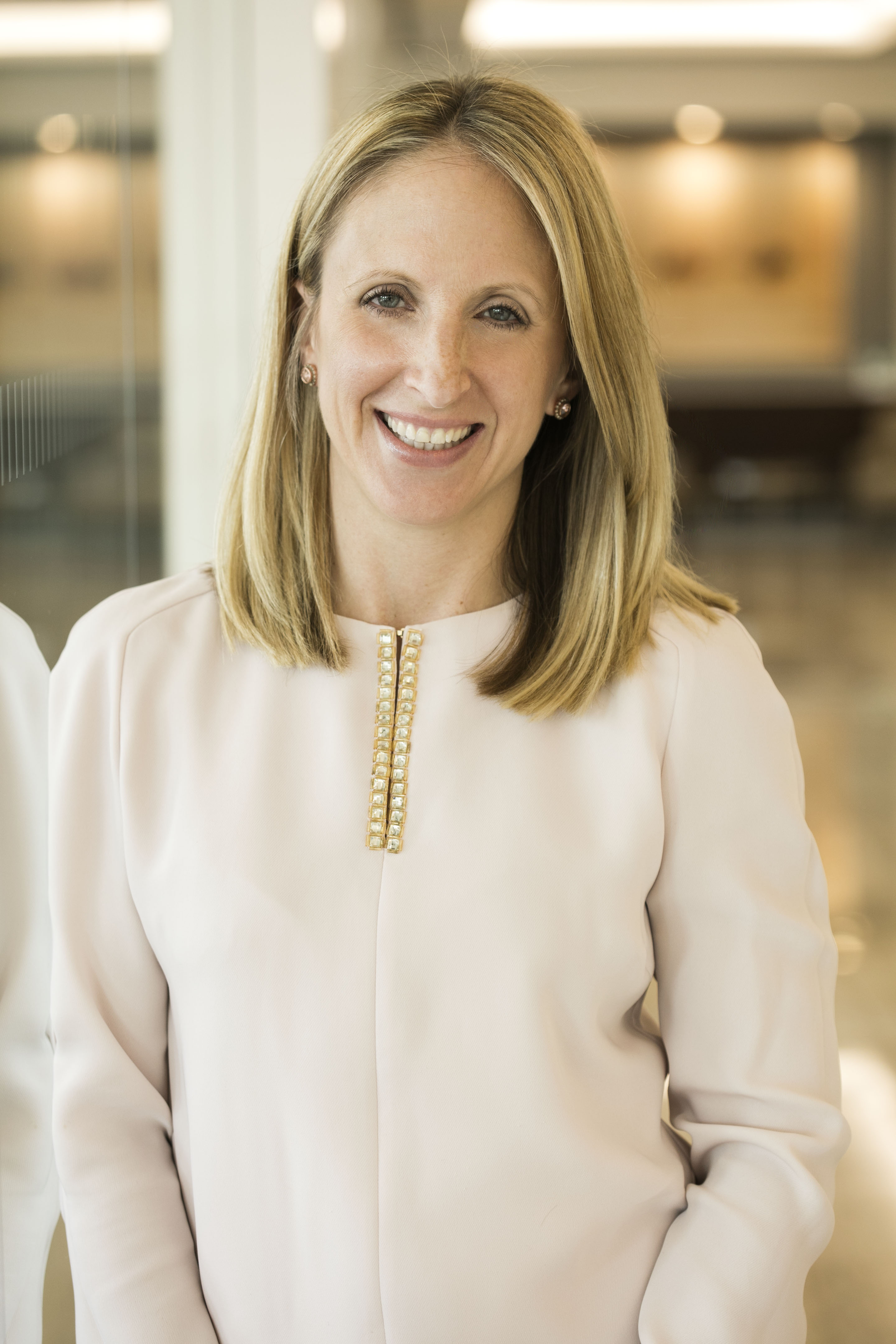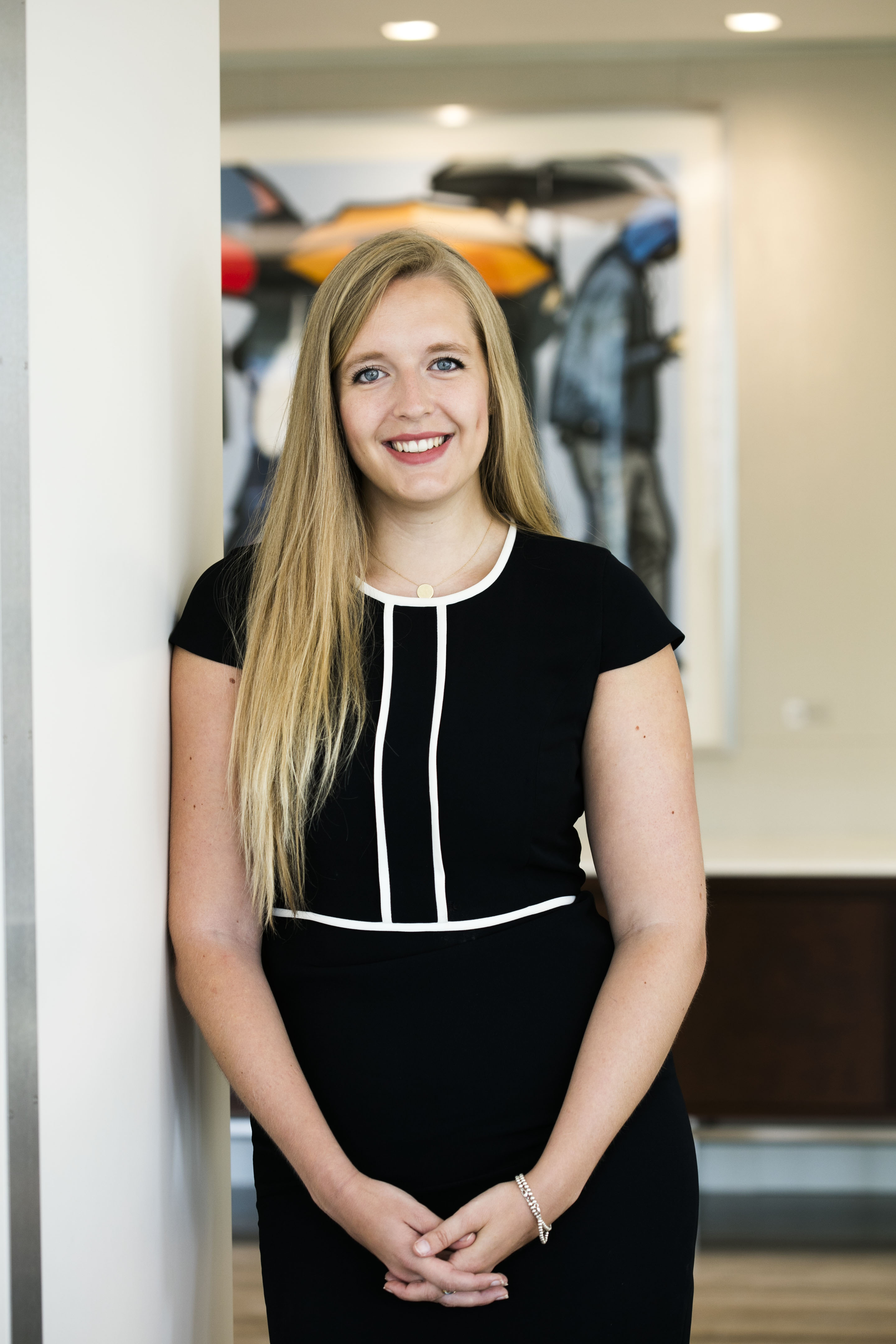Best Work Placement Scheme – City Firm
Morrison & Foerster (UK) LLP

Best Work Placement Scheme – City Firm
Best Work Placement Scheme – City Firm
Farrer & Co LLP

There are no “identikit” people at Farrer & Co, a firm that knows its strengths lie in the varied skills, talents and experiences of its lawyers. With the firm’s edge provided by its people, a high-quality recruitment process is a must – the cornerstone of which is Farrers’ first-rate vacation scheme, which deservedly takes this year’s award for Best Work Placement Scheme – City Firm for providing candidates with an experience of real trainee life across the variety of practice areas in which it boasts unique expertise.
Farrer & Co is a firm which has an inclusive and modern approach without losing sight of the traditional values that have made it such a success since it was founded in 1701.
Claire Gordon, graduate recruitment partner, explains the importance of giving candidates an opportunity to gain first-hand experience of the firm: “Personality is very important. We don’t have identikit people here; we like to have individuals who bring their own skills and talents to the table and we want people who are going to be keen to work as part of a team both with our clients and for our clients.”

With only 10 places per placement, the firm’s two-week vacation scheme takes place once at Easter and twice during the summer months. Anthony Turner, training partner, explains that it is a great opportunity “for potential lawyers to see whether they want to come and work with us. There are a variety of practice areas here and a variety of people, so it’s an opportunity for them to see whether it is a firm that they like. We also hope that they will do other placements and see other firms so that they can make a slightly more informed decision.” Kathleen Heycock, deputy training partner, adds: “We want people who are open minded and curious, and who have thought carefully about why they are interested in law, why they’re interested in being a solicitor and why they’re interested in Farrers. It’s important that they’re able to explain those three things; but they’re not otherwise expected to have all the answers and to have mapped out their entire career plan in advance.”
Matching this description is Xinlan Rose – a first-year trainee solicitor who completed her work placement scheme with Farrers in 2016. She looks back at why Farrers caught her attention while she was applying: “Mostly it was the unique practice areas, from safeguarding to reputation management, and the diversity of the clients, such as charities and educational institutes. The idea of working for top British institutions was really exciting to me given their influence on the society we live in.”
They sit in the office as though they are a new trainee solicitor – we involve them in real-life work.
Winner of this year’s award for ‘Best work placement scheme – City firm’, Farrers designed the scheme to give students a real sense of what it is like to be a part of the long-established firm and to showcase to students what it is like to work in law. “Each individual will be with a different team each week and so experience two different areas of the firm,” Claire explains. “The idea is that they are given the sort of work that a trainee will do. Our aim is to give them as much of a real feel as possible while also giving them completely free access to lots of junior solicitors for them to talk to and get a sense of what being a lawyer is really like.” In addition to the real work that the students are given, Anthony adds that they “work toward a case study, alongside their client work, which they present to the other trainees and newly qualified lawyers. Ultimately, they sit in the office as though they are a new trainee solicitor – we involve them in real-life work”.

Xinlan echoes Anthony’s ‘real life’ statement, as she looks back on her valuable experience on the work placement scheme: “It enables you to understand what makes the firm so distinctive. Not only does it give you an accurate representation of what the firm’s atmosphere is like and the type of work that the teams do, it also helped me to build relationships across the firm. People still remember you from the scheme, which is lovely.”
Xinlan explains that she was “completely blown away by how different the firm was to other law firms. Everyone is free-thinking and perceptive. It is an inclusive environment where people want to bring the best out of you. I really appreciate having such great exposure to partners and associates who take the time to explain legal concepts and the context of each task to make to make sure that I understand, and enjoy, what I am doing.” Kathleen emphasises the firm’s inclusivity and the influence a firm’s size has on its culture: “We are able to make it personal because we are the right size to make it personal.”
We have a ‘trainee night out’, which involves relaxed drinks and dinner with the current 20 trainees.
Alongside showcasing the reality of working in law, the scheme also offers a number of social activities which those on the work placement scheme are encouraged to attend as they are the perfect opportunity for students to get to know various people at the firm and also to showcase themselves as individuals: “We have a ‘trainee night out’, which involves relaxed drinks and dinner with the current 20 trainees,” explains Xinlan. “There are also various sports events like cricket, football matches and the JP Morgan run. On my vacation scheme we were also invited to the summer BBQ. Lots of partners come to these events because they’re genuinely interested in meeting you and are keen to recruit the next generation of Farrers’ lawyers. These events allow for a free-flowing discussion which helps you to get a sense of the individuals in the firm and show off your own personality. There is usually a social activity every evening. They’re not compulsory but it is a great opportunity to meet a mixture of trainees, associates and partners.”
The scheme is part of the recruitment process and replaces the first-round interview, so it is important that students on the work placement scheme use the social activities outlined above as an opportunity to showcase themselves in a more relaxed environment. However – understanding that some people may struggle to do a work placement scheme– it is not the only way that Farrers recruits. Claire explains: “We are delighted to have people from a really diverse range of backgrounds applying to us and some are simply not able to attend a work placement scheme, for a variety of reasons. It is important to make sure our process works for those candidates as well, so that we are seeing the very best people. For us, the trainees are the lifeblood of the firm and we are taking on 10 people with the hope that those 10 will become partners in the firm. We are genuinely looking for people who we can imagine running the firm in future.” Anthony adds: “We take it all incredibly seriously because we recruit to retain. We hope that these 10 trainees will stay with us for the bulk of their careers.”

Kathleen explains how Farrers has thought carefully about how to get those on the work placement scheme exposure to partners, associates and trainees, not only while they are working in their teams but also by supporting successful candidates before they even start at the firm and throughout the training contract: “From the moment a trainee accepts a training contract with us, they are in touch with the firm. There are events that they can come to on a regular basis over the two years before they even walk through the door.” Claire adds: “Although in theory our graduate recruitment team’s responsibility is to help us find our trainees each year, their role does not end there. They provide phenomenal support to the trainees throughout their training contracts; they’re with them for the whole journey with lots of sensitivity, humour and tact. Our trainees are highly valued by Farrers, and having a training partner and a deputy training partner as well means that there are a lot of people invested in making sure that they are being looked after and getting a chance to grow and progress to meet their full potential.”
This personal approach is part of what makes Farrers so distinctive.
This personal approach is evident both in the work placement scheme and throughout the training contract. Xinlan explains: “We have our own supervisor who we share a pod with. They give us mid-seat and end-of-seat appraisals, and we also work with them on a day-to-day basis. I’ve been really impressed with how holistic their approach is; they explain not only how to improve technically, but what you could be doing in order to develop your own career. This personal approach is part of what makes Farrers so distinctive.”
Claire explains that it is important for constructive feedback to be given throughout the training contract as it gives trainees an opportunity to grow as much as possible. Further, the trainees are also each allocated an individual partner as their trainee principal whom they are encouraged to get to know and meet with regularly. Claire expands on this important relationship: “A trainee’s principal is an extra point of contact for them throughout the training contract and beyond. They are ready to be a sounding board and a source of support for the trainee who may be looking for advice or guidance on any number of matters. Meetings tend to be informal, perhaps over coffee or lunch and it can be quite a fun relationship which continues once a trainee qualifies. My principal – from when I trained 20 years ago – is still here and still keeps an eye out for me and my career. It can be a really special relationship that develops over a long time and can be hugely valuable.”
This vision for longevity is an important characteristic of Farrers, its award-winning work placement scheme and the individuals the firm recruits. Highlighting reasons for the firm’s success, Claire explains: “The partners all want to make sure that the firm goes from strength to strength, we are custodians for the next generations of lawyers coming through. A high proportion of our partners trained at the firm and that speaks volumes about the firm’s culture and our vision and values. There’s a real sense of longevity and history – not in terms of being old fashioned but instead having traditional values with a modern approach and making sure we are paving the way for the next generation coming through.”
By Olivia Partridge

Best Work Placement Scheme – City Firm
I completed vacation schemes at four firms across two years, and this firm stood out as the best for the quality of work and people I met. There was great exposure to different departments and clients.
Best Work Placement Scheme – City Firm
HFW

Best Work Placement Scheme – City Firm
Best Work Placement Scheme – City Firm
Watson Farley & Williams LLP

Best Work Placement Scheme – City Firm
Best Work Placement Scheme – City Firm
Fieldfisher

Best Work Placement Scheme – City Firm
Best Work Placement Scheme – City Firm
Kennedys

Best Work Placement Scheme – City Firm
Best Work Placement Scheme – City Firm
Charles Russell Speechlys LLP

Best Work Placement Scheme – City Firm
Best Work Placement Scheme – City Firm
Hogan Lovells

Best Work Placement Scheme – City Firm
Best Work Placement Scheme – City Firm
Farrer & Co LLP
I was really surprised by the genuine interest that people took in the vac scheme students.
As a history student, Farrer & Co first-year trainee Rebecca Price made sure to take advantage of the opportunity to dip her toe into the water before committing herself to a career with any one firm. “I initially took a scattergun approach when applying for firm open days. I then was able to take a slightly more tailored approach to vacation schemes and ended up doing four in my GDL year,” she laughs. “At first I didn’t really know what I was looking for, but I quite quickly realised that very large City firms weren’t for me; rather, I wanted to focus on mid-sized firms doing both interesting private client and commercial work. Farrer obviously stood out here – it was fascinating on paper and has an incredible history and interesting broad range of clients, so I wanted to experience that first-hand.”
Our scheme gives the best exposure to what the firm actually does, the quality of the training and trainees
Anthony Turner, trainee partner at the Lincoln’s Inn Fields-based firm, approves of Rebecca’s approach; after all, the decision of where to train can be life changing. “Vacation schemes set the direction of your career,” he asserts. “So not to do a variety of them is probably a mistake. However, sometimes that’s easier said than done, as they can be very competitive and it’s unlikely that you will be accepted onto every one to which you apply.”

The firm’s training principal Paul Krafft concurs that while acceptance is not guaranteed, that shouldn’t stop a prospective lawyer from putting themselves forward – no matter where they are in their career. “What you will get from a vacation scheme depends largely on what stage you are at with your studies, but it will beneficial. For example, if you are unsure about whether you want to go into the law you will be able to see what work actually goes on in a firm and whether it interests you,” he explains. “If you’re slightly further down the line and have decided that a career in law is definitely for you, then you get to see the various firms first-hand and differentiate them from one another in a way that you can’t by simply relying on what they say about themselves on their website.”
As well as the firm getting to sell itself to prospective trainees, vac schemes provide aspiring lawyers with the opportunity to make an impression in a way that a covering letter and CV – no matter how impressive – just cannot. “Doing a vac scheme undoubtedly helps the recruitment process, on both sides,” explains Anthony. “It enables an applicant to speak with authority during the interview about why they want to work at your firm specifically.”
Once you have cleared the first hurdle of getting onto the vacation scheme of your choice, how do you ensure that you make your mark? “I think the best thing you can do is go out of your way to meet as many people as possible,” considers Rebecca. “There are normally three schemes every year at the firm, which means that you are one of perhaps 30 students, so you want to be remembered –and in a good light!” As well as being outgoing and personable, Rebecca urges vac schemers to push themselves: “Even if you don’t understand exactly what’s being asked of you, it’s important you give it a stab.”
“When the vac schemers arrive nobody expects them to be good at the law,” confirms Paul. “What I look for is a willingness to get stuck in.” Anthony has what is, on the face of it, a very simple request: “The best thing you can do to impress is to be normal! I know that’s very difficult when you’re junior and desperately trying to impress, but if you can relax while still being diligent you will make a great impression.”
So, while the benefits of participating in a vacation scheme – or four – are clear, what makes Farrer’s stand out? “Our scheme gives the best exposure to what the firm actually does, the quality of the training and trainees,” Paul maintains. “I think Farrer is unrivalled in the quality of the breadth of work that we do and it’s hard to appreciate that without being here.” Without spending time at the firm it would be all too easy to underestimate the work it does,” Anthony agrees. “There is a probably a presumption that we are more of a private client firm than a corporate/commercial firm, however we have a fantastic reputation for both and more than half of our firm is devoted to the latter. You might like that or you might not, but you won’t know if you don’t try it out.”
Confidence, proactivity and practicality are really the three things that I look for in candidates
This diversity of practice areas was one of the first things that stood out for Rebecca while she was on her placement – that and the friendliness and warmth afforded her and her fellow vac schemers. Described by clients as a “likeable bunch”, the lawyers at Farrer go out of their way to make their vac schemers feel welcome. Not only does the senior partner hold an introductory session for the students – offering them an insight into the firm and her role in it – but there are also various informal social events designed to encourage vac schemers to mingle with senior legal staff. Rebecca confirms that there are numerous opportunities to interact with individuals at all levels: “It depends to some degree on when your vac scheme is, but I took part in the firm’s annual firm-wide football match, attended lunches and went on a night out during my two-week placement. The current vac schemers took part in the firm’s cricket match last week, then they have the football match and a night out next week – so they’re being kept busy!”
As well as a full social calendar, vac schemers have plenty of work to get on with during their time with the firm. “Each week they are in a different department and are expected to muck in and take on the work – where possible – that would be given them as a trainee,” explains Anthony. “They have an overall supervisor who looks after them during their time with us, and then in each team they will have someone who looks out for them and ensures that they’re happy with the work given them. We try to vary the work depending on the level of knowledge –some will have law degrees, others won’t, for example.”

During Rebecca’s placement she was given work that she found both fascinating and inspiring. “My first week was spent in the private client team and I recognised the name of the ultimate owner of a trust that I was working on which was really interesting to me,” she recalls. “In the second week I was working in the charities department and did some research on the Human Rights Act and equality – it was fascinating.” To her surprise and delight she was also introduced to clients and invited to attend meetings.
The respect afforded its vac schemers is indicative of Farrer’s egalitarian ethos and was further reflected during Rebecca’s placement by the amount of encouragement students were given to interact with the firm’s most senior lawyers. “We were encouraged by our supervisors and trainee-minders to seek out work from partners,” she recalls. “There are no separate offices here, it’s an open-plan pod system, so a vac schemer could be sat in the same pod as a partner – and, in fact, on my placement I was. Not only does this mean that there is no obvious hierarchical structure that prevents you from speaking with a partner, but in fact you wouldn’t necessarily know who was a partner and who wasn’t!”
As well as this friendly, inclusive attitude, the firm’s commitment to offering a good work-life balance became evident to Rebecca during her placement – for her, this was the final piece of the puzzle when it came to deciding where she wanted to train. “There is such a great respect here for the work-life balance, and I really notice that this isn’t the same for trainees at other firms,” she enthuses. “Although I’ve had some very busy times, it is encouraged that if you can get off in the evening, you really should.”
When it comes to selecting its trainees, Anthony explains that the key attributes Farrer searches for won’t only be found in exam results. “Confidence, proactivity and practicality are really the three things that I look for in candidates,” he reveals. “What I mean by the latter is that everyone who attends an interview will be intelligent, but what you want them to be able to do is apply that intelligence to the work they’ll be undertaking. A client will call you up with a problem and will want practical solutions, not reams of law. So if a trainee can have a bit of interest in understanding a client’s business needs, that’s certainly impressive.”
The firm acknowledges that the jump from studying to embarking on a training contract is a big one and it does what it can to ease its trainees in by providing a comprehensive induction programme and including them in firm life from the moment they accept their position. “Before our trainees start there are Christmas drinks and opportunities to meet trainees in the year above,” explains Anthony. “Each trainee has a minder and a principal who is responsible for them throughout their training. If they have any issues then they can speak to the principal in confidence – it’s not linked to a specific seat, but rather offers a higher-level eye over them,” he continues. “They also have a supervisor in each seat, and then Paul and I are the training principals who have overall responsibility for the trainees. There is a lot of continuity and support throughout the two years and a net is there to deal with difficult issues, even if they t tend not to arise.”
Rebecca believes that having this safety net provided by more experienced members of the firm enables trainees to fly higher than they might otherwise. “The team needs trainees to get involved and take on work,” she argues. “That work is always monitored and we can run anything by our supervisors that we’re not totally confident of, but ultimately you’re encouraged to spread your wings as soon as you feel confident enough to do so.”
Recruiting the brightest individuals who want to take on these challenges is what Anthony deems as the firm’s success. It achieves this by encouraging an open, engaging interview environment in which candidates feel challenged but not intimidated. “We only take 10 trainees a year so they’re not making cups of tea,” Paul jokes. “They’re doing proper work. A lot of the more senior partners have trained at the firm and have come up through the ranks. We want to keep our trainees and so we invest a lot of time and resource in them.” Rebecca, for one, certainly appreciates this investment and hasn’t looked back since first setting foot in Farrer as a vac schemer: “The firm has exceeded my expectations and I feel very lucky to train somewhere with such a great reputation, which has such interesting diverse work and with such fascinating and kind colleagues.”

Best Work Placement Scheme – City Firm
I was really surprised by the genuine interest that people took in the vac scheme students.
Best Work Placement Scheme – City Firm
Gibson, Dunn & Crutcher UK LLP
The vacation scheme gave me a real insight into the work areas and environment of the firm, and I felt as if I was undertaking the same sort of work that I would be doing as a trainee.
It is hard to imagine a more intriguing sentence to describe the foundation of a law firm, reproduced verbatim here: “In May 1872, a tall, 34-year-old, red-bearded lawyer stepped down from the stagecoach at the Plaza of Los Angeles.” If you’re not intrigued by that, then perhaps the dynamic and entrepreneurial Gibson Dunn is not the firm for you – a point that Mark Speretto, partner and training principal, makes about the nature of the firm’s culture: “We are looking for bright high performers, who are confident, entrepreneurial and, importantly, who will fit into this environment. So you need to be driven, a good team player, a fast learner and someone who can think on their feet. Some people prefer to be spoon fed, but that won’t happen here – we want those who are keen on a career at a U.S. established firm and know why they are choosing that experience over anything else.”
Gibson Dunn, winner of this year’s award for ‘Best work placement scheme – City firm’, has 20 offices and over 1,300 lawyers globally, with its London office existing for more than 35 years. Clementine Hollyer, second-seat trainee, was attracted to the firm’s scheme for a variety of reasons, as she explains: “I was keen to learn more about US firms; having done some work experience at a magic circle firm when I was at school, I wanted to see the other side of the coin. I knew that I was interested in exploring litigation, and Gibson Dunn’s name kept popping up in relation to some interesting, high-profile cases. Their pro bono work, such as on the Proposition 8 case in California, was also indicative of the firm’s values.”

The firm’s three-week vacation scheme, which has been running for six years and from which the firm recruits approximately 90% of its trainees, is characterised by a huge amount of effort from throughout the firm. “It is our principal trainee recruitment tool and although not the only way to get a training contract, we prefer to choose from the scheme,” explains Mark. “And it’s of benefit to both sides; we get to see someone interacting in our office environment and they have the opportunity to take part in interesting work and see what City lawyers do day to day.”
Some people prefer to be spoon fed, but that won’t happen here – we want those who are keen on a career at a U.S. established firm and know why they are choosing that experience over anything else
The scheme is designed to showcase the firm, but also to leave all participants with the sense they’ve had a valuable experience – regardless of whether they go on to secure a training contract. Katy Edwards, the firm’s graduate recruitment and professional development manager, describes the way in which this is achieved: “When we designed the programme, we thought carefully about our own vacation scheme experiences and about how best to balance getting to know the students, whilst ensuring that they would learn something while here. During the three weeks students split their time between a transactional seat and a disputes seat and we encourage their supervisors to involve them in live matters to reflect as closely as possible what life as a trainee is really like. We set a busy timetable and we hope that this helps hone their skills juggling competing deadlines. Even the negotiation exercise, which is often regarded by students as their favourite task, helps develop useful practical skills.”
There is plenty of opportunity for detailed feedback on the assessed written tasks, one of which has a corporate slant while the other is disputes focused. “The exercises are marked by fee earners, who feed back to the students how they’ve done,” describes Katy. “We think it’s important for participants to understand what worked well and how they might improve; we don’t want them to feel that their hard work has been lost into a vacuum.”
Mark expands: “Along with the detailed feedback, we give them tips and techniques, such as presentation and advocacy skills, and practical advice about how firms work internally and what to look out for in terms of difference. We have a long discussion about culture and what it means – not just in terms of day-to-day work, but how the firm is structured and the people it employs. Even if they don’t receive an offer, they will leave hopefully having learnt something valuable.”
Our existing trainees are deeply involved with recruitment, as they remember the process – and are helping to assess those who might potentially be their trainees in two years’ time!
A huge investment of time and energy from the entire firm ensures that the scheme is a success and is a reflection of the emphasis put on home-grown talent. “Our existing trainees are deeply involved with recruitment, as they remember the process – and are helping to assess those who might potentially be their trainees in two years’ time!” reflects Mark. “We want that continuity and internal growth because it means that on day one, your associates are ready to go and are working in an area that they have chosen.” Even more so if those trainees have done the scheme: “Most firms say similar things in their brochures and websites, especially about work and culture, so there’s really no substitute for seeing it in person. Someone who has accepted a training contract having done the scheme is in a much stronger position; there are no surprises on day one!”
Clementine recalls some of the specific features of the scheme: “There was an excellent mix of assessed tasks and real-life work with a supervisor. I was pleased to find that the work was light on proofreading and admin tasks; as a non-law student, having the chance to do some interesting legal research was great as a way of starting to learn about the law. I was also taken to a signing, which I had helped prepare the documentation for.”

In addition to work and assessments, the scheme features a dazzling array of social functions, such as a legal treasure hunt, bowling, a night at Flight Club, and drinks on the firm’s roof garden. Clementine comments: “There was a lot of socialising and networking; it was a full-on three weeks in that respect! We played ping pong, had a curry night, enjoyed champagne and canapes on the London Eye with some of the partners, and were encouraged to play in the firm’s softball team.”
The scheme features ‘coffee conversations’, which are informal chats between students and partners about what it’s like to work in individual departments, the type of work and cases they’re involved with, and life as a trainee. Katy comments: “There are a huge number of partners and senior associates involved in the programme, and students commonly mention how impressed they are with how many partners they get to speak to.” Clementine adds: “The coffee conversations were great, as we were able to ask questions and chat informally. And my supervisors both did a brilliant job of introducing me to everyone on the floor, so I felt that I was able to meet almost everyone at the firm while I was there.”
Having Lord Falconer as one of the firm’s partners is a unique bonus for the vacation schemers, as Katy describes: “He is happy to chat to all the students about his experiences as lord chancellor and as a senior commercial silk, and is keen to find out about their legal aspirations. Having access to someone of that calibre is an amazing opportunity.”
There was an excellent mix of assessed tasks and real-life work with a supervisor. I was pleased to find that the work was light on proofreading and admin tasks; as a non-law student, having the chance to do some interesting legal research was great as a way of starting to learn about the law.
In fact, opportunities abound on the scheme – but it is incumbent on participants to make the most of them, as Katy points out: “Be yourself, but remember that it is your one opportunity to impress; it is a competitive process, and everyone is academically able, so you need to go all out to make sure that your name rises to the top of the list when decisions are being made. Produce your best work every time, adopt a commitment to excellence, and show your enthusiasm for both the scheme and the firm.” Clementine chips in with her advice: “I was aware that I wasn’t coming from a legal background, but I knew that I had many skills to showcase and I focussed on doing my best, communicating well with my supervisor about the progress of my work, being organised and professional.”
An emphasis on personal connections translates all the way through to when the trainees start at the firm and are assigned a mentor, who is a senior lawyer, and a trainee buddy, who is there to support the new joiner throughout the training contract. Katy explains: “The buddy system works really well; the buddies have a budget to take their trainee out for drinks and lunches, or perhaps to see a show or to attend a sporting event together. Trainees also have a more senior mentor to help them settle in and offer more professional support and advice on career progression. And our doors are literally always open – for any questions at all.”
Size plays a big part in the trainee experience, as Mark explains: “We often find that applicants are attracted by the size of the firm and an intake of just six. Fewer trainees means that the work is more varied and comes from lots of different parts of the business. Our trainees aren’t just siloed away in one area.”

Clementine confirms this: “Being a relatively small group of trainees means that we are part of the fabric of the firm and are in demand, as there is a lot of work! We are kept busy and able to be involved at all levels – especially when compared to a firm that takes on hundreds of trainees. The variety is huge and the level of involvement is high.” She continues: “It has exceeded my expectations – I had heard horror stories about the hierarchical structure and intense working hours at American law firms, but my experience at Gibson Dunn couldn’t be more different; I’ve been able to get involved with everything that I’ve wanted to and have had much more client and partner contact than I was expecting.”
Katy sums up Gibson Dunn’s success in terms of both the vacation scheme and trainee recruitment generally, and how it feeds into the culture of the firm as a whole: “We don’t believe in making applicants jump through hoops, instead taking a much more traditional, meritocratic approach to recruitment, which I think sets us apart. We are all extremely proud to be part of the firm and we place a huge value on reaching the right people and getting the right message across. Everyone at the firm – partners, associates and trainees alike – is involved in recruitment and has a seat at the table. I truly think that is one of the secrets of our success.”

Best Work Placement Scheme – City Firm
The vacation scheme gave me a real insight into the work areas and environment of the firm, and I felt as if I was undertaking the same sort of work that I would be doing as a trainee.

